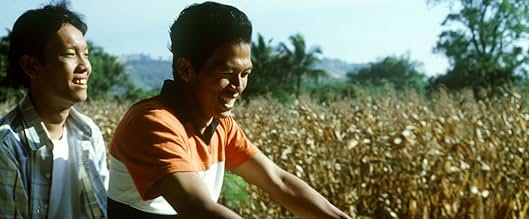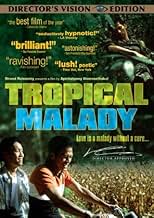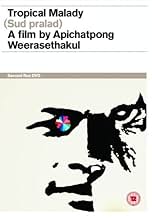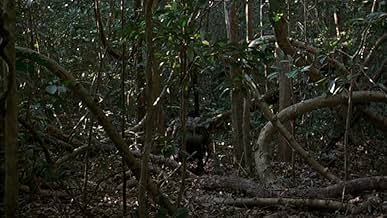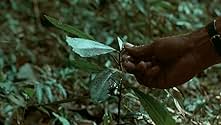VALUTAZIONE IMDb
7,1/10
6632
LA TUA VALUTAZIONE
L'amore tra un soldato e un ragazzo di campagna, chiuso nella tradizione folkloristica Thai che coinvolge uno sciamano con abilità muta forme.L'amore tra un soldato e un ragazzo di campagna, chiuso nella tradizione folkloristica Thai che coinvolge uno sciamano con abilità muta forme.L'amore tra un soldato e un ragazzo di campagna, chiuso nella tradizione folkloristica Thai che coinvolge uno sciamano con abilità muta forme.
- Regia
- Sceneggiatura
- Star
- Premi
- 7 vittorie e 8 candidature totali
Recensioni in evidenza
10blindg
"Tropical Malady" from the Thai director Apichatpong Weerasethakul, Jury Prize in the last Cannes Film Festival, is a movie that really consume the inside, like a terminal disease. Every senses of your body will be over-excited, there is a TERRIFIC use of sound effects, that will render the tropical forest a living entity, intelligent, thinking, speaking. The contrast between the horrors and anguishes of modern time and the most charming folk legends , that awaken the most genuine human side from the bottom of our hearts is something quite unique and unforgettable.
It's hard to tell about the story without spoil it. Watch it, no matter what.
It's hard to tell about the story without spoil it. Watch it, no matter what.
This film crushed me to the bone, exhausted my heart, and I was never again the same. It brought back faith in the uncompromised vision of cinema. Its images will forever stay in my memory; the stare of the tiger, the smell of the tropical rain...this is sensory cinema, where time is freezed and narrative is stripped, and what's left is for us to finally feel. It is utopian, but it is also sad, because we realize that there is never (and never will be) a utopia. People say love is utopian, yet according to Mr. Weerasethakul, it is also very consuming, which becomes possessive, and at the end, a burden. At the end, the soldier goes into the jungle to find what's been consuming him. The tiger. He is lost and completely hopeless; he has no purpose without the tiger, yet he cannot possibly live with the tiger because of its nature. They are co-dependent; co-exist. Is that what great love is all about?
Having had a good think about the film after seeing it this afternoon, I still can't escape the feeling that there was a really excellent film in the subject matter and narrative elements, but that the director just hadn't quite found a way to get that film to the screen. Instead, he found a film that ultimately taxes most viewer's patience. There were some really lovely elements, I agree, but there is something about the editing that was just this side of over indulgent (and I happen to generally like long, loving, camera shots that are meditative!). The jungle portion of the film, IMHO, suffered from a lack of visual information in most instances (and yet this is one of the strengths of some the individual jungle scenes, like those of the tree, the tiger and ghost ox, where, just because of this unrelenting sameness, stand out marvelously). It could have been half the length and by virtue of that, twice as effective. Having said as much, I look forward to seeing more by this director, he clearly has a head on his shoulders and the courage to tackle difficult (yet rewarding) ideas.
Even if the first part is pretty "straight" forward the second part left me baffled - maybe that was the point?... I am almost certain that I can interpret it somehow but anything I would say might and can be wrong, that's because I am somewhat convinced it's a very Thailand "kind of thing", it being a folk story. I think it has something to do with greed, because of the little story in the first part with the two farmers and the little monk.
I am still mesmerized by Apichatpong Weerasethakul's approach to framing and camera work. I find it fascinating and boring but in a good way. It's like therapy, it's like really absorbing the nature or the setting. It's like an optical illusion sometimes, the longer you stare at a frame, the deeper you go, it's hypnotizing.
Of to the next Weerasethakul - but not right away. I will let this one settle in first.
I am still mesmerized by Apichatpong Weerasethakul's approach to framing and camera work. I find it fascinating and boring but in a good way. It's like therapy, it's like really absorbing the nature or the setting. It's like an optical illusion sometimes, the longer you stare at a frame, the deeper you go, it's hypnotizing.
Of to the next Weerasethakul - but not right away. I will let this one settle in first.
A soldier named Keng, meets a young man named Tong in Thailand, the two begin a friendship. Keng makes constant sexual and amorous advances on Tong, who laughs them off, or makes a game out of them. He is never exactly interested, but never fully rebuffs either. The two make trips back and forth from the Jungle where Tong lives and Keng is on patrol with his military unit, to the city. We see the lush silent landscapes and the bustling city life, from dance hall karaoke to the cinema to the solitude of a quiet lake. When Keng finally makes a move in such a way, as to be beyond any doubt of a desire for intimacy (he kisses Tong's hands), Tong responds in turn by doing the same, and then walks into the darkness of the forest. Before Keng, can come to understand, the film takes a drastic turn in tone, style, and mood.
We are told by an interjected 3d person narrator the story of a shaman who is a shape-shifter known to take different animal forms, who used to roam the forest playing tricks on people. One day a cunning hunter, did not fall into a trick and shot him, mid transformation from woman into tiger. The spirit of the shaman was then stuck as half tiger half man and eternally doomed to stalk the forest; tricking and devouring all in it's path.
Keng, is then on patrol in his section of the forest, exploring rumors from villagers, about some "thing" killing cattle and causing general havoc. Alone on patrol in the woods, he becomes plagued by strange sounds, a sense of dread, and images of a naked boy, a tiger, spectral animals, and a glowing phosphorescent tree (which looks as beautiful as those in Aranofsky's "The Fountain"...I have no idea how they got that effect, on their budget, but it's miraculous...).
This second half of the film, of course calls into question our understanding of Keng and Tong's prior relationship (if Tong ever existed at all.). While part one, is reminiscent of a modern quirky love story like "Chungking Express", the second half is like Terrance Mallick shooting a remake of "Predator". All sense of time and space, is swallowed by the jungle, and implicit politics of the first half are turned inside out in the second half; it is literally cat and mouse, with the possibility that the cat may want to be eaten by the mouse, or vice versa.
The second half is also marked by the inclusion of tribal art and cave paintings, depicting the story of the shaman and the soldier, with sub-titles accompanying them. To paraphrase a description by director Weerasethakul it's like "a silent film for the first people on earth". And together with the visual effects, confident cinematography, clever use of editing, music, and sound, and disarming performances, it becomes magical. "Tropical Malady" combines the most modern and ancient notions of fear and desire, and makes something "new" out of them.
This is Thailand's "Solaris", a story of the changing shapes and forms of want and need, of being deceived and allowing yourself to be deceived by them. It's slow pace, forces reflection on questions like what form or body comprises love, is it purely physical or something more, is it perhaps deception itself, a fools errand we invent to forget the savagery of the jungle around us, is it the need to devour or be devoured? There's a Scottish legend called Tam Lin (one of my favorites), long story short, a woman falls in love with a faerie, and discovers he used to be a man, but made a deal with the faeries to serve them if they spared his life, after an accident. Tam tells the women she can restore his humanity and claim him, if when the faeries pass on Halloween night, she will wrap her arms around him and not let go no matter what happens. She does this, and the faeries transform him into all manner of creature, some hot, some cold, some thorny, others slimy, some which bite and claw, etc, but she holds on throughout all his changes, til eventually she finds herself just cradling a man. And the faeries begrudgingly let her keep him, because she held on to what she loved, despite the way it changed with time.
The film opens with these lines, "All of us are by nature wild beasts, our duty as human beings is to become like trainers, who keep their animals in check. And even teach them to perform tasks alien to their bestiality"-Tom Nakajima "Tropical Malady", is a good deal more ambiguous, I suspect more predatory and reflective as well, than Tam Lin, and comes from the opposite side of the world, but like that story manages to peculiarly harmonize emotional sensitivity and mythic scope, into a coherent whole.
I wished I would have paid more attention to Weerasethakul "Mysterious Object At Noon" the first time I had the chance, he has a talent for experimenting with narrative and style that is missing in many films endlessly praised these days. The phrase I kept hearing from other reviews or the one I liked the best was "If Brokeback Mountain, was a mountain on the island from "Lost"...it's callous, with a smidgen of truth, but this is a much better movie than that. It is very slow moving though, the first hour will give you no hint of the second half (other than a few visual ones, look at the various statues in the backgrounds, etc), but for the bold and the patient, there is lush hypnotic reward to be had.
We are told by an interjected 3d person narrator the story of a shaman who is a shape-shifter known to take different animal forms, who used to roam the forest playing tricks on people. One day a cunning hunter, did not fall into a trick and shot him, mid transformation from woman into tiger. The spirit of the shaman was then stuck as half tiger half man and eternally doomed to stalk the forest; tricking and devouring all in it's path.
Keng, is then on patrol in his section of the forest, exploring rumors from villagers, about some "thing" killing cattle and causing general havoc. Alone on patrol in the woods, he becomes plagued by strange sounds, a sense of dread, and images of a naked boy, a tiger, spectral animals, and a glowing phosphorescent tree (which looks as beautiful as those in Aranofsky's "The Fountain"...I have no idea how they got that effect, on their budget, but it's miraculous...).
This second half of the film, of course calls into question our understanding of Keng and Tong's prior relationship (if Tong ever existed at all.). While part one, is reminiscent of a modern quirky love story like "Chungking Express", the second half is like Terrance Mallick shooting a remake of "Predator". All sense of time and space, is swallowed by the jungle, and implicit politics of the first half are turned inside out in the second half; it is literally cat and mouse, with the possibility that the cat may want to be eaten by the mouse, or vice versa.
The second half is also marked by the inclusion of tribal art and cave paintings, depicting the story of the shaman and the soldier, with sub-titles accompanying them. To paraphrase a description by director Weerasethakul it's like "a silent film for the first people on earth". And together with the visual effects, confident cinematography, clever use of editing, music, and sound, and disarming performances, it becomes magical. "Tropical Malady" combines the most modern and ancient notions of fear and desire, and makes something "new" out of them.
This is Thailand's "Solaris", a story of the changing shapes and forms of want and need, of being deceived and allowing yourself to be deceived by them. It's slow pace, forces reflection on questions like what form or body comprises love, is it purely physical or something more, is it perhaps deception itself, a fools errand we invent to forget the savagery of the jungle around us, is it the need to devour or be devoured? There's a Scottish legend called Tam Lin (one of my favorites), long story short, a woman falls in love with a faerie, and discovers he used to be a man, but made a deal with the faeries to serve them if they spared his life, after an accident. Tam tells the women she can restore his humanity and claim him, if when the faeries pass on Halloween night, she will wrap her arms around him and not let go no matter what happens. She does this, and the faeries transform him into all manner of creature, some hot, some cold, some thorny, others slimy, some which bite and claw, etc, but she holds on throughout all his changes, til eventually she finds herself just cradling a man. And the faeries begrudgingly let her keep him, because she held on to what she loved, despite the way it changed with time.
The film opens with these lines, "All of us are by nature wild beasts, our duty as human beings is to become like trainers, who keep their animals in check. And even teach them to perform tasks alien to their bestiality"-Tom Nakajima "Tropical Malady", is a good deal more ambiguous, I suspect more predatory and reflective as well, than Tam Lin, and comes from the opposite side of the world, but like that story manages to peculiarly harmonize emotional sensitivity and mythic scope, into a coherent whole.
I wished I would have paid more attention to Weerasethakul "Mysterious Object At Noon" the first time I had the chance, he has a talent for experimenting with narrative and style that is missing in many films endlessly praised these days. The phrase I kept hearing from other reviews or the one I liked the best was "If Brokeback Mountain, was a mountain on the island from "Lost"...it's callous, with a smidgen of truth, but this is a much better movie than that. It is very slow moving though, the first hour will give you no hint of the second half (other than a few visual ones, look at the various statues in the backgrounds, etc), but for the bold and the patient, there is lush hypnotic reward to be had.
Lo sapevi?
- QuizThe same year that this film was chosen to compete at the Cannes, the government sent a delegation of Thai film-makers to the festival. Ironically, when the director asked to be included, officials denied him support, saying that there were no more plane tickets.
- ConnessioniFeatured in Storia del cinema: Un'odissea: Cinema Today and the Future (2011)
I più visti
Accedi per valutare e creare un elenco di titoli salvati per ottenere consigli personalizzati
- How long is Tropical Malady?Powered by Alexa
Dettagli
Botteghino
- Lordo Stati Uniti e Canada
- 46.750 USD
- Fine settimana di apertura Stati Uniti e Canada
- 270 USD
- 26 giu 2005
- Lordo in tutto il mondo
- 46.750 USD
- Tempo di esecuzione
- 1h 58min(118 min)
- Colore
- Mix di suoni
- Proporzioni
- 1.85 : 1
Contribuisci a questa pagina
Suggerisci una modifica o aggiungi i contenuti mancanti


